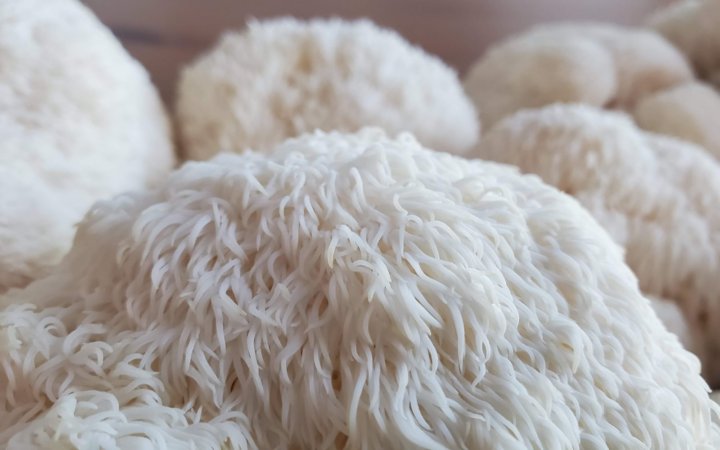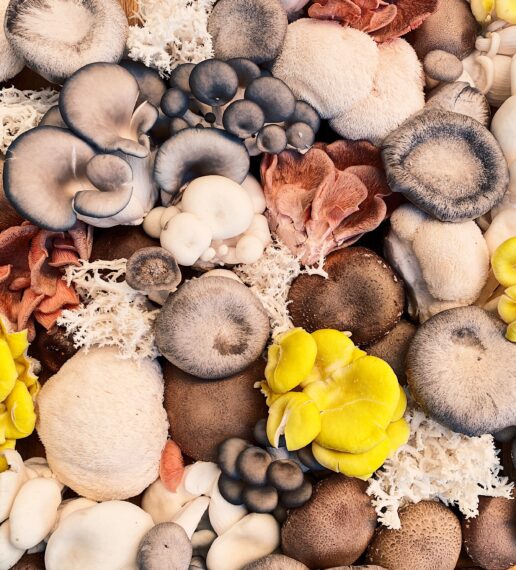Mushrooms For Sleep (Top 3 Types and How They Work)
Restful sleep is the secret weapon to an optimized life. Missing out on sleep means missing out on your full potential both mentally and physically, and it puts you at a higher risk for chronic diseases.[1] But a good night’s sleep can be elusive—which you know if you’ve ever spent the night tossing and turning.
The struggle to get some shuteye has led to an ongoing search for reliable, natural sleep supplements. In this quest to snag more Z’s, one powerful option is often overlooked: using medicinal mushrooms for sleep*.
Can mushrooms really help you sleep, though*? Evidence suggests supplementing with specific fungi could be the key to kicking insomnia and improving sleep quality*.
You’re Not the Only One Who Can’t Sleep
The majority of adults around the world have some kind of trouble sleeping. Only 49% feel they get enough sleep, and 80% wish their sleep was better quality. A shockingly low 10% of adults globally say they sleep “extremely well.”[2]
In the U.S., somewhere between 50 and 70 million adults suffer from sleep disorders. Statistics from the American Sleep Association reveal the impact of this epidemic:[3]
- 37.9% of adults report “unintentionally falling asleep during the day” during the last month
- 30% report short-term insomnia
- 10% struggle with chronic insomnia
Lack of effort can’t be blamed for all these issues. Many people try to improve sleep through various methods like reading, watching TV or playing soothing music before bed.
Chances are you’ve tried some of these tactics, too—but they haven’t worked, or you wouldn’t be looking for the best supplements for sleep!
Can Using Mushrooms for Sleep Help?
Until now, mushrooms probably haven’t crossed your mind as a potential addition to your bedtime routine (unless you’re the type to eat pizza in bed, but that’s another story). But certain medicinal mushrooms—including reishi, lion’s mane and cordyceps—could be just what you need to start sleeping better and enjoying improved performance in the rest of life*.
Science has a lot to say about how these mushrooms may affect your brain, sleep patterns and even circadian rhythm*. If you’re still skeptical about trying medicinal mushrooms at night, check out how these functional fungi can supercharge your slumber.
Reishi Mushrooms: The Superhero of Non-REM Sleep
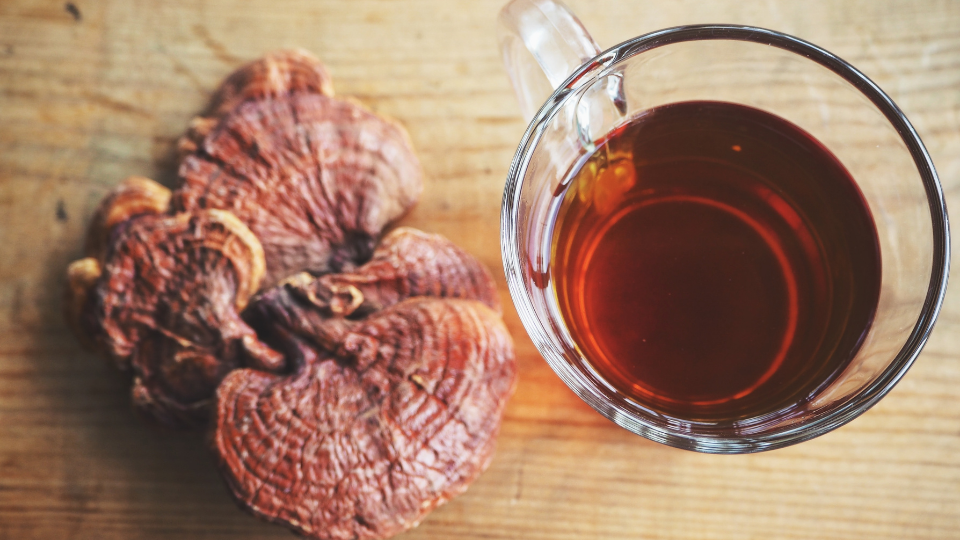
Reishi (Ganoderma lucidum) is one of the most popular mushrooms for sleep*. It plays a starring role in some of the most popular bedtime drinks on the market—and for good reason*.
Rodent studies show extracts from reishi may help you fall asleep faster, sleep for longer and spend more time in non-REM (NREM) sleep*.[4,5] NREM sleep includes the deepest phases of sleep, during which your body does a lot of the important recovery work that’s essential for daily productivity, focus and performance*.
Reishi may also have an effect on delta wave activity, which is associated with both the transition to and the period of deep sleep*.[6]
Why is this important? Being able to fall asleep more easily and get more sleep overall means:
- Spending fewer nights tossing and turning
- Waking up more refreshed
- Recovering faster from exercise and daily stress
- Having a stronger immune system
Better sleep is even associated with living a longer, healthier life! Sounds like a good excuse to wind down with a cup of reishi mushroom tea before bed.
Lion’s Mane: Not Just for Focus
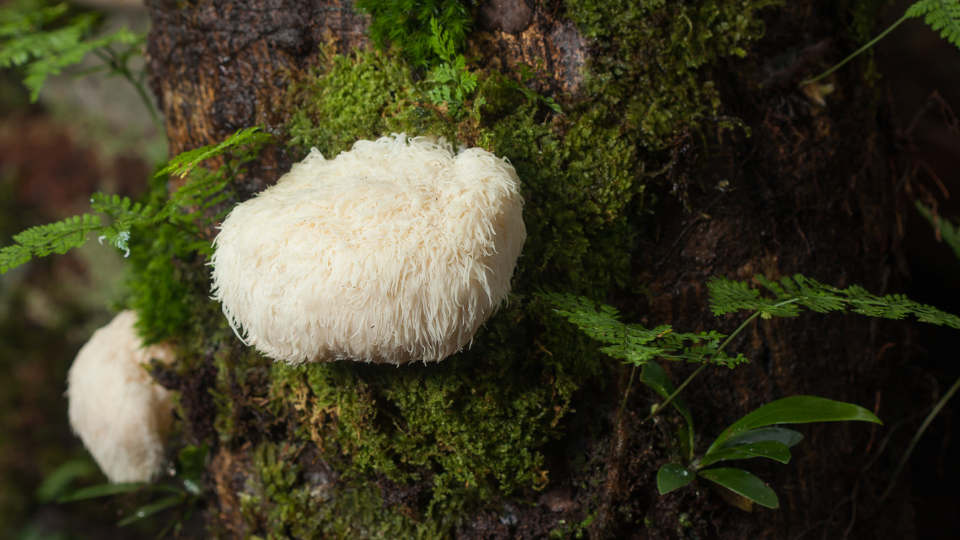
At first, lion’s mane (Hericium erinaceus) may not seem like a great choice for capping off your nightly routine. It’s generally associated with focus and productivity—not one of the best mushrooms for sleep—but its unique effects on the brain could also help you overcome insomnia*.
One study pitted lion’s mane against the chronic sleep problems of eight Japanese undergraduate students*. After one month of taking a particular lion’s mane mushroom extract called Amyloban® 3399, the group reported less anxiety and insomnia*. Sleep quality also improved slightly, but the results weren’t statistically significant*.[7]
Lion’s mane extracts may also help correct circadian rhythm problems that lead to delayed sleep phase disorder, a condition in which sleep patterns are delayed two or more hours from what’s considered normal*.[8,9]
What’s responsible for this apparent balancing effect? It could be brain-derived neurotrophic factor (BDNF). BDNF levels appear to be directly related to the duration and intensity of sleep deprivation,[10] with people who experience insomnia exhibiting lower levels of BDNF.[11]
Lion’s mane may be able to increase be BDNF precursors, allowing the body to make more of it and correct deficiencies associated with sleep disorders and disturbances.*[12] Therefore, taking a lion’s mane supplement before bed could provide an opportunity for a more balanced, refreshing night’s rest*.
Cordyceps: Regulating Circadian Rhythms
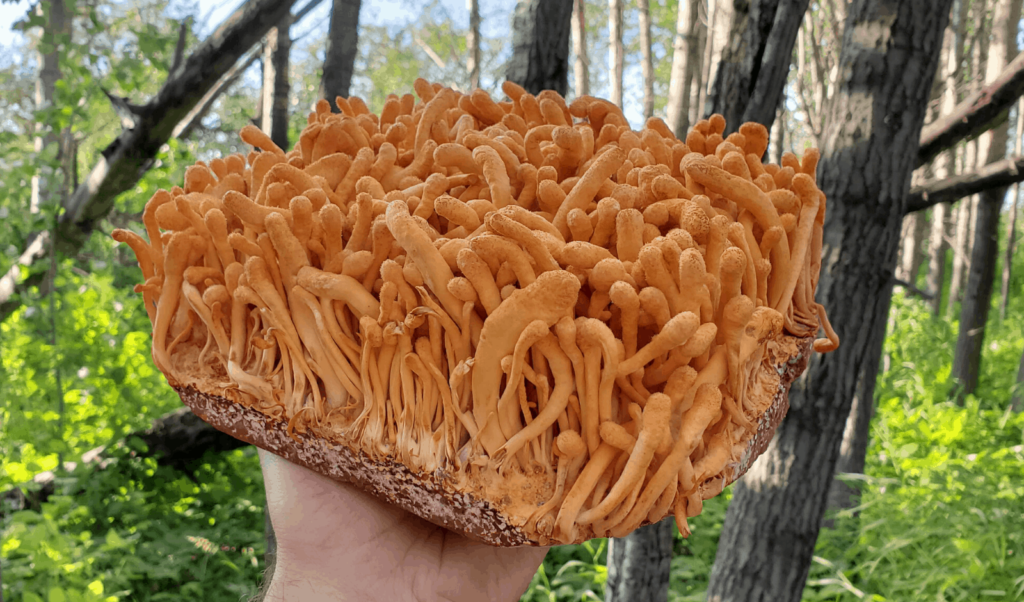
Cordyceps’ claim to fame is its ability to positively influence energy levels and improve exercise performance*. So, why does it belong on a list of mushrooms for sleep?
The secret weapon in Cordyceps that could lead to better rest is an adenosine analog called cordycepin*. Adenosine plays a role in regulating sleep and wakefulness,[13] and cordycepin’s similar structure could allow it to exhibit comparable effects as it interacts with adenosine receptors*.
These effects may include:
- Increased NREM sleep*
- Increased 5-HTP levels, possibly leading to subsequent increases in serotonin and melatonin*
- Reduced glutamine and acetylcholine levels, which could improve deep sleep and prevent unwanted wakefulness*[14,15]
- Faster recovery from jet lag and other forms of circadian rhythm disruption*[16]
- Increased power density of theta waves, which are associated with certain types of learning and memory*
These potential benefits for sleep could work in harmony with Cordyceps’ energy-promoting properties to create a positive feedback loop*. Sleeping well prepares you to tackle your routine much better than when you’re fatigued, and the additional support from cordyceps can help you power through the toughest parts of your day*.
The combination is also beneficial if you like tough workouts. This mushroom can serve the dual role of giving you stamina during exercise and improving sleep for faster recovery*. Experiment with taking Cordyceps before bed, as well as at other times of day, to see what works for you*.
Tips and Precautions When Using Mushrooms for Sleep
If you’re currently taking prescription sleep medications—or any other prescriptions—talk with your doctor or a qualified health practitioner before using mushroom supplements. (And it goes without saying that you shouldn’t take yourself off your sleep meds in favor of medicinal mushrooms.)
If you’re not on medication, go ahead and give mushrooms a try at bedtime*. It might take a few tries to find the best regimen; not everyone reacts to mushrooms the same way! You may find that lion’s mane makes you too alert to sleep or Cordyceps jazzes you to hit the gym instead of hitting the sack. And if Reishi puts your lights out, it’s best to take it as close to bedtime as possible.
Once you discover the best mushroom supplement for your sleep routine, make it part of your nightly schedule. You might find a cup of mushroom tea and a good book every evening is just what you need to go from tossing and turning to sleeping like a baby.
Looking for more ways to get better sleep? You may find these articles helpful:
